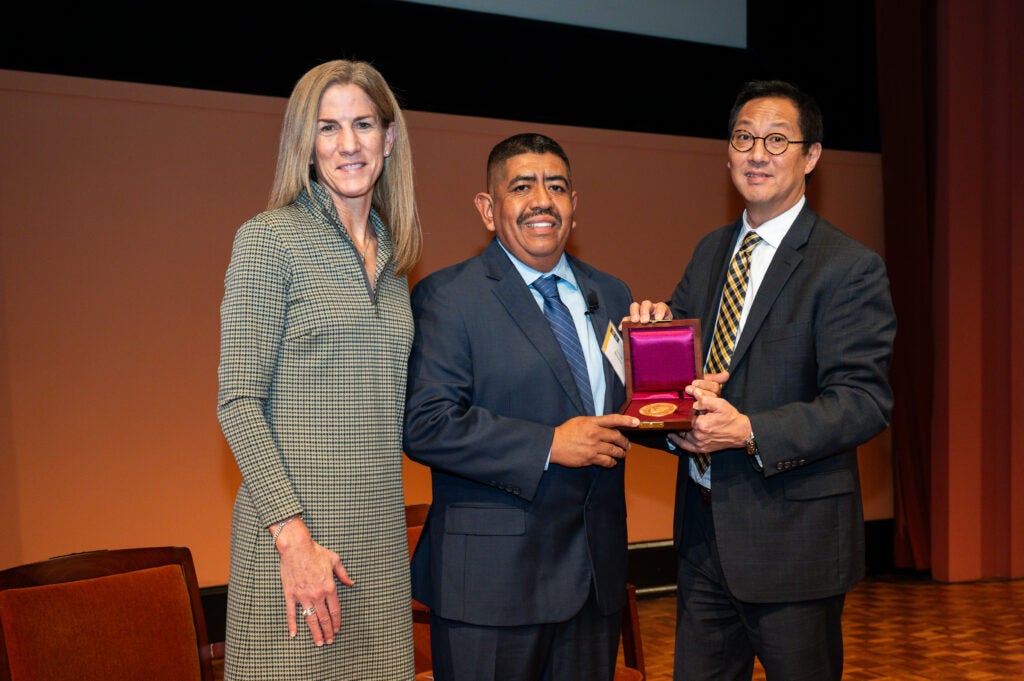By Katie Kelton
The University Record
October 12, 2023
The exploitation of laborers is a disease that remains rampant throughout the world, says Lucas Benitez, a co-founder of the Florida-based labor and human rights organization the Coalition of Immokalee Workers.
To combat these abuses of human rights — including physical and sexual assault, child labor and wage theft — a proper vaccine is needed, Benitez said in the Wallenberg Lecture that coincided with him receiving the University of Michigan’s 2023 Wallenberg Medal.
Benitez, who also is a key organizational leader and member of the Coalition of Immokalee Workers’ Fair Food Program worker education team, spoke to a crowded Rackham Auditorium on Oct. 10.

The Wallenberg Medal and Lecture honors the legacy of Raoul Wallenberg, who graduated from U-M’s College of Architecture in 1935 and saved the lives of tens of thousands of Hungarian Jews near the end of World War II.
Administered by the university’s Donia Human Rights Center, the Wallenberg Medal is awarded to those who perpetuate Wallenberg’s accomplishments and values by standing up for the helpless, defending the integrity of the powerless and speaking out on behalf of the voiceless.
President Santa J. Ono welcomed Benitez and presented him with the Wallenberg Medal. Ono praised Benitez’s courageous fight for workers’ rights, and said he is an inspiration “for us to not close our eyes to injustice, intimidation and inhumanity.”
“Most importantly, you teach us to be optimistic.… It is this optimism that reminds us that just one whisper for positive change — just one whisper — can drown out the cries of hundreds of skeptics and can move a silent multitude to action,” Ono said.
Benitez delivered his lecture, “The Fight for Fair Food and the Future of Worker-driven Social Responsibility,” in Spanish. A screen beneath the stage displayed an English translation, and guests who did not speak Spanish were given headsets to listen to an interpreter.
Following the lecture, Benitez took part in a question-and-answer session moderated by Steven R. Ratner, director of the Donia Human Rights Center and the Bruno Simma Collegiate Professor of Law.
In his lecture, Benitez shared the story of his life, and the experiences that urged him to fight for change.
Growing up in southern Mexico, Benitez moved to Florida at age 17 with his brother in the hopes of finding work to help pull their family from poverty.
The brothers found work in a tomato farm, where Benitez was shocked to find cruel, exploitative conditions inflicted upon the farm workers. He recalled defending himself against a crew leader intent on beating him when he finished working before his colleagues and waited for them to catch up.
Benitez and his brother decided to take a stand against the low wages, poverty, and violence. They started holding meetings with a small group of workers in the back room of a small church in Immokalee, Florida.
A young worker appeared at the group one day covered in blood. The man’s crew leader beat him for leaving his post to get a drink of water. Benitez said this sparked a catalyst in the group.
“We realized that we needed to say and express that an injury to one is an injury to all,” he said.
The CIW marched through the streets of Immokalee and caught the attention of several farm bosses in the area. Benitez saw the possibility that the group could work together and create a tangible change.
He said consciousness in the community with a commitment to creating a world built on justice is needed to make change.
“Until the fruit of our labor benefits us as workers, we will not have the true freedom, prosperity and liberty of society which we really seek,” Benitez said.
In the early 2000s, the CIW developed its plan to prevent wage theft, physical violence and sexual harassment. Benitez said the group’s model for prevention is “a vaccine for some of the worst exploitations,” such as assault, sexual assault, child labor and forced labor.
“The very first thing you must do when you’re trying to develop a vaccine for some of the worst sickness in our society, such as the exploitation of farmworkers, is understanding its symptoms, its roots in what helps to spread its contagion,” Benitez said.
The root of the illness, he said, was the imbalance of power. The CIW decided to tackle this imbalance by approaching the top of the supply chain and promoting consciousness among the public.
The group announced a Taco Bell boycott to draw the company’s attention. It drew many allies and eventually won its first agreement with Taco Bell. The agreement stipulated the company would implement a code of conduct in its supply chain and maintain ongoing discussions with the workers.
In the years following, CIW won similar legal agreements with several other major companies, including McDonald’s, Burger King and Subway.
The CIW and Fair Food Program have grown exponentially throughout the past three decades. The groups help educate workers of their rights, and assist workers trapped by what Benitez characterized as modern-day slavery and indentured servitude.
He called upon those at the lecture to get involved in this fight for freedom and advocate for basic human rights for all farm workers.
“We need you to help spread the word about this vaccine to assist us in studying the solution and helping us to replicate it,” Benitez said. “I hope that the 21st century will be defined in the economy as having not consumers, but responsible consumers.”
